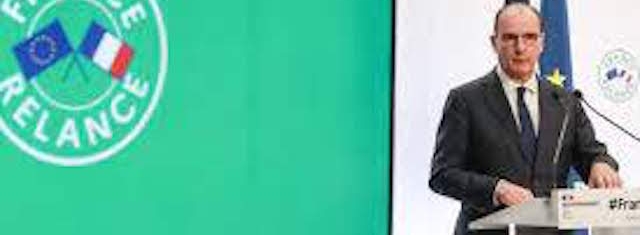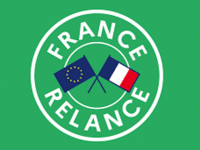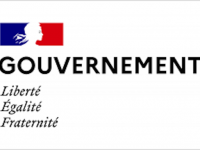Business
FERNCH PM JEAN CASTEX UNVEILS A €100 Bn RECOVERY PLAN INCLUDING €40Bn OVER C
FROM THE EUROPEAN AGREEMENT OF JULY

Jean Castex French PM unveils Recovery Plan (Source: France tv)
USPA NEWS -
On 3 September 2020, the Prime Minister, together with three ministers who are primarily involved (Bruno Le Maire, Minister of Economy and Finance, Barbara Pompili Minister of Ecology and Energy and Elisabeth Borne Minister of Labor), unveiled the priorities and key stages set out in France´s recovery plan. It includes European aspects, not least as regards the plan´s goals and financing. "This €100 Billion recovery plan ““ €40 Billion of which comes from the landmark European agreement reached in July ““ will have one overriding objective: employment." Jean Castex, Prime Minister, said
French Prime Minister, Jean Castex, acknowledged over the recovery Plan, and the inclusion of ecology and fighting the climate change, in scale of Europe : « The recovery will therefore be green: €30 Billon are poised for investment across four key sectors ““ energy retrofits of buildings, transport, the agricultural transition and energy ““ to make France´s economy the first major low-carbon economy in Europe".
French Prime Minister, Jean Castex, acknowledged over the recovery Plan, and the inclusion of ecology and fighting the climate change, in scale of Europe : « The recovery will therefore be green: €30 Billon are poised for investment across four key sectors ““ energy retrofits of buildings, transport, the agricultural transition and energy ““ to make France´s economy the first major low-carbon economy in Europe".
A € 100Bn RECOVERY PLAN FROM WHICH € 40Bn IN EUROPEAN CONTRIBUTIONS-------------------------------------
With the desire to amplify the efforts implemented with the support plan, the Prime Minister presented on September 3, 2020 the “France Relance“ plan, a roadmap for the economic, social and ecological overhaul of the country. This plan is the result of a broad national consultation set up to learn the lessons of the crisis. It is part of the continuity of the projects undertaken since the start of the five-year term. The Recovery Plan, unveiled, by the French government, has followed a process involving dialogue and the broadest possible consultations, particularly with:
“¢ French, European and international economists;
“¢ The European partners.
€40BN IN EUROPEAN CONTRIBUTIONS------------------------------------------------------------------------------------------------
The recovery plan´s €100Bn budget will be unlocked over two years (2020-2022) and financed by various instruments:
“¢ the third amending finance act for 2020,
“¢ the finance bill for 2021 and Investments for the Future Program called PIA4
“¢ the Social Security financing bill for 2021,
“¢ the Recovery Plan for Europe
“¢ The European Union is thus set to finance 40% of France´s recovery plan. France will receive these direct grants on the basis of an investment and reform strategy that the Government intends to present to its European partners and the European Commission in early 2021. This strategy, called the "national plan for recovery and resilience“, will cover the 2020-2023 period.
“¢ European funding will be awarded to support investments and reforms which have a lasting effect on productivity, support and drive forward the energy and digital transition and facilitate the convergence of European economies.
“¢ The debt associated with the recovery plan will not be repaid by tax increases, but by growth and the transformations undertaken.
FOR A GREEN AND INDEPENDENT RECOVERY IN FRANCE AND EUROPE
“¢ France´s goal is an ambitious one: to become the first major low-carbon economy in Europe by achieving carbon neutrality in 2050. Everything that is carried out in the context of the recovery plan must address this ambition.
“¢ France has also chosen to work towards the modernisation of its production facilities, massive investment in the technologies of the future ““ especially green tech ““ lowering production taxes, strengthening support for research, training and development of existing national skills and expertise.
“¢ These choices must restore our economic independence, not from an insular, nationalistic point of view but in terms of renewed self-sufficiency for the benefit of both France and Europe.
“¢ Energy use accounts for nearly 70% of France´s greenhouse gas emissions. The recovery must set the stage for France to take the lead at the forefront of low-carbon and renewable hydrogen generation technologies, by:
“¢ Supporting projects fronted by companies in local areas, in a bid to help bring about a French range of available hydrogen solutions;
“¢ Setting up a support mechanism for hydrogen production using water electrolysis through tenders and pay supplements;
“¢ Creating a project of common European Interest (IPCEI) to support industrialisation on the territory and the development of demonstrators. This project is aimed at developing and industrialising French solutions for fuel cells, tanks and materials to pave the way for the development of hydrogen vehicles for mobility as well as electrolysers for low-carbon hydrogen production and decarbonisation of industrial sites.
“¢ Furthermore, the fourth Investments for the Future programme (PIA) is leveraging €11.5 Bn between now and 2022 in support of innovation and particularly investment in the technologies of the future. Its guarantees include sustainable and predictable structural financing for higher education, research and innovation ecosystems with a view to France becoming the most nurturing ground for researchers and entrepreneurs in Europe. Source: French Government
Rahma Sophia Rachdi Jedi Foster Covid-19 Growth Economy Minister Bruno Lemaire Recovery Plan Jean Castex French Pm
Liability for this article lies with the author, who also holds the copyright. Editorial content from USPA may be quoted on other websites as long as the quote comprises no more than 5% of the entire text, is marked as such and the source is named (via hyperlink).








